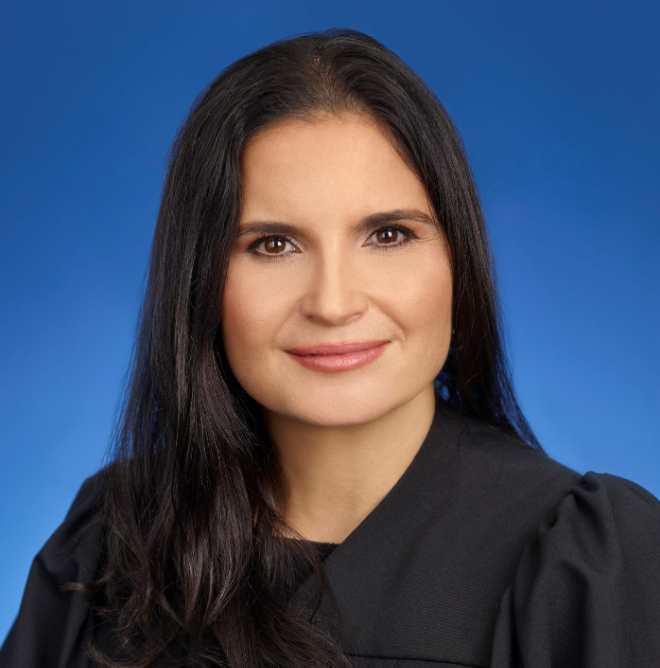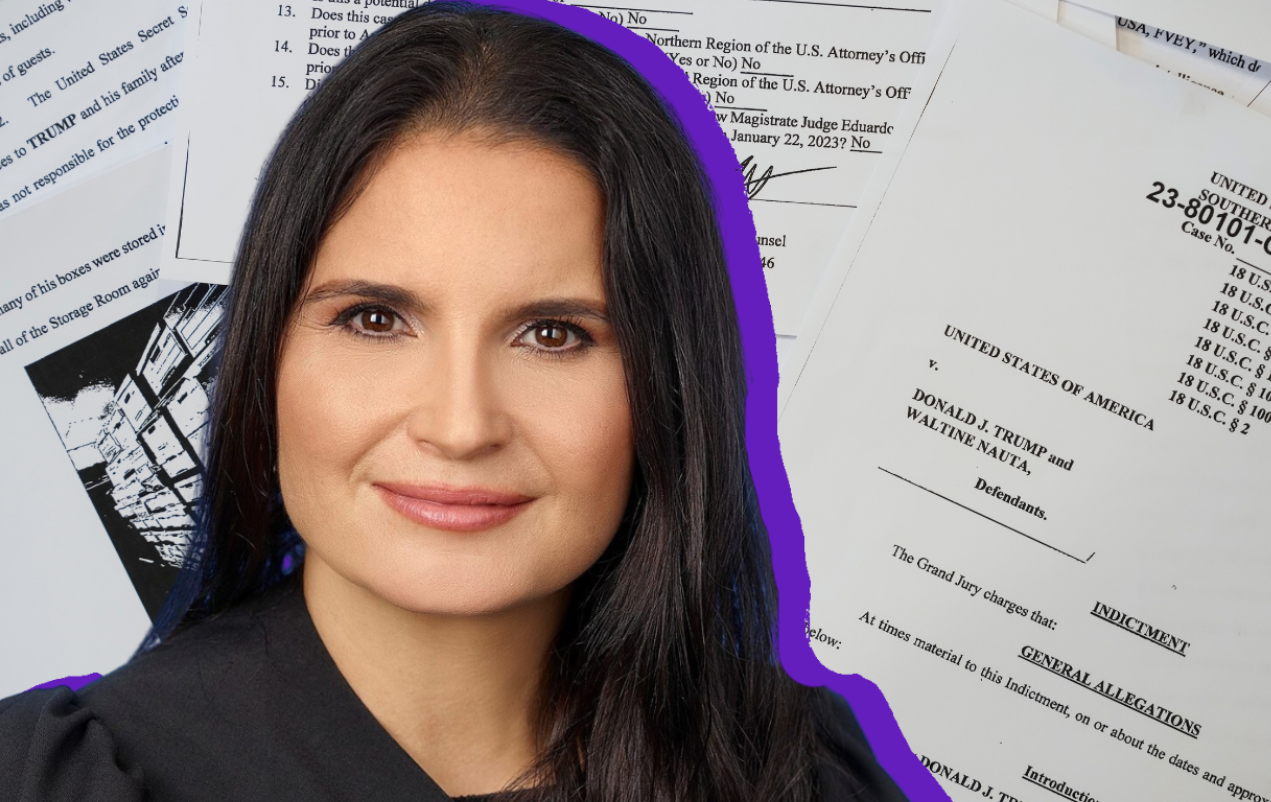Aileen Cannon is an eminent personality known for her distinguished role as a Colombian-American Judge. Born to a Colombian mother and an American father, Cannon’s dual heritage has significantly influenced her perspective and approach in the judicial sphere. She was nominated for the position by President Donald Trump in 2020 and subsequently confirmed by the Senate, making her one of the youngest federal judges in the United States. Prior to her role as a federal judge, she functioned in the capacity of an assistant United States attorney in the Southern District of Florida, where she contributed significantly to the prosecution of various criminal cases.
Cannon’s unique background and her meticulous work ethic have enabled her to bring a fresh perspective to the judiciary. Her bicultural upbringing has instilled in her a deep understanding of diverse cultures and an ability to balance different viewpoints, both of which are essential for impartial and fair judgement. Her bilingual proficiency in Spanish and English also ensures better communication and understanding with a wider range of defendants and plaintiffs, thus fostering a more inclusive courtroom environment.
While serving as an assistant United States attorney, Cannon gained substantial experience in handling and resolving complex cases, which strengthened her ability to deliberate and make judicious decisions. This experience, coupled with her unwavering commitment to maintaining high ethical standards, has further cemented her reputation as a fair and respected figure in the judiciary. Her dedication towards ensuring justice is served has been recognized and highly appreciated by her peers and the public alike.
Notably, Aileen Cannon’s appointment as a federal judge also represents a significant milestone in the representation of Colombian-Americans in the US judiciary. Her groundbreaking achievement serves as an inspiration for many young Colombian-Americans aspiring to contribute to the judiciary, by demonstrating that with tenacity and dedication, they too can rise to such esteemed positions. She is often seen as a symbol of empowerment for the Colombian-American community, embodying their aspirations and potential.
Apart from her distinguished legal career, Cannon is also known for her philanthropic endeavors. She regularly volunteers at local community centers and contributes to various charitable causes. She believes in giving back to the society and uses her platform to advocate for social justice issues. In many ways, Aileen Cannon is not just a judge, but also a beacon of hope and a role model for many aspiring legal professionals and community activists. Her story is a testament to the power of hard work, determination and commitment to serving the public.

Early Life and Educational Background
The early life and educational background of an individual often play a significant role in shaping their personality, career choices, and overall outlook on life. This period represents an essential phase where one’s foundational values and beliefs are established and developed. Educational backgrounds, in particular, provide the necessary tools and knowledge for individuals to navigate through life’s complexities. It equips them with critical thinking skills, emotional intelligence, problem-solving abilities, and a wide range of other competencies that are necessary for surviving and thriving in the world.
The early life experiences of a person, on the other hand, significantly contribute to their emotional and psychological development. Events and circumstances during early childhood can influence one’s perception of the world and themselves, their coping mechanisms, and their interpersonal relationships. For example, children who grow up in warm, supportive, and stimulating environments are more likely to develop positive self-esteem and strong social skills. Conversely, those who experience neglect, trauma, or deprivation may struggle with emotional and social challenges later in life.
The educational background of an individual does not only refer to the formal education received in schools or universities. It also includes the informal education obtained from family, community, society, and life experiences. This type of education is just as valuable, if not even more so, as it teaches individuals about the realities of life, interpersonal relationships, social norms, and cultural variations. It is during this phase that individuals may develop their interests, hobbies, and passions, which could potentially influence their future career choices.
In conclusion, the early life and educational background of an individual are crucial elements that significantly shape a person’s development, capabilities, and overall life trajectory. They lay the foundation for one’s values, beliefs, skills, and competencies, which are essential for navigating through the complexities of life.
Federal Judicial Service and Career Highlights
The Federal Judicial Service is a vital component of the United States’ governmental structure, providing a crucial platform for adjudication and dispute resolution. Individuals who serve in this capacity are charged with interpreting and applying the constitution, ensuring justice, fairness and equity in all cases. This high level of responsibility necessitates a career filled with significant achievements and highlights.
Many individuals who have served in the federal judiciary have notable career highlights that underscore their dedication to justice and their commitment to upholding the constitution. For example, Thurgood Marshall, the first African American Supreme Court Justice, played a pivotal role in landmark cases such as Brown vs. Board of Education, which ended racial segregation in public schools. Similarly, Justice Ruth Bader Ginsburg, the second woman to serve on the Supreme Court, championed gender equality and workers’ rights throughout her lengthy tenure on the bench.
Another noteworthy figure in the Federal Judicial Service is Chief Justice John Roberts. He has presided over numerous significant cases and has often been the deciding vote on contentious issues. His decisions have had far-reaching impacts on a multitude of areas, from healthcare to campaign finance.
Justice Sonia Sotomayor, the first Latina Supreme Court Justice, is another example of excellence in the Federal Judicial Service. Her career is marked by her commitment to civil rights and her ability to effectively articulate her views on complex legal issues. Her decisions have consistently reflected her dedication to protecting the rights of individuals against government overreach.
In conclusion, the Federal Judicial Service is a critical facet of the United States government system. Its members, through their rulings and interpretations, shape the nation’s legal landscape, affecting every aspect of American life. Their careers, marked by significant achievements and high-profile cases, are testament to their dedication to the principles of justice, fairness and constitutional interpretation.

Key Cases and Notable Decisions
Key cases and notable decisions form a significant part of our societal fabric. They are the landmark moments that often define and refine the parameters of justice, fairness, and societal norms. These pivotal moments are often the result of extensive analysis, debate, and deliberation, and their repercussions are felt across generations. For instance, the landmark Brown v. Board of Education case transformed the landscape of education in the United States, effectively ending racial segregation in schools. In the realm of technology, the ruling on Apple Inc. v. Samsung Electronics Co. set a precedent for future intellectual property disputes. These cases underline the fluidity of societal norms and the power of decision-making bodies to shape them. More importantly, they underscore our collective responsibility to ensure fairness and justice.
In the corporate world, key cases such as the Enron scandal and the Volkswagen emissions case have served as wake-up calls, leading to stricter regulations and more vigilant oversight. They have highlighted the necessity of transparency, accountability, and integrity in business operations, and have significantly influenced corporate governance norms worldwide.
Moreover, notable decisions in areas like healthcare, environmental conservation, and human rights have paved the way for significant societal and policy changes. The Roe v. Wade decision, for instance, has had far-reaching implications on women’s reproductive rights, while the Paris Agreement on climate change has set a global action plan to mitigate global warming.
In essence, key cases and notable decisions serve as pillars of our societal evolution. They not only shape our understanding of justice and fairness but also guide our collective response to evolving societal challenges. Through their far-reaching implications, they continue to underscore the importance of informed, equitable, and responsible decision-making in shaping a just and progressive society.
Trump v. United States: Civil Case Overview
The Trump v. United States civil case is a significant chapter in American political history, largely due to its intricate connection with the tenure of the 45th President, Donald Trump. The case revolves around inquiries into the financial dealings of the Trump Organization and the allegation of misrepresenting the value of assets for tax advantages and loan approvals. The case is further complicated by the involvement of tax returns and financial documents, emphasizing the contentiousness of transparency and accountability. This case is not just about financial irregularities, but also about the inherent conflict of interest and the potential for misuse of power.
The focal point of the controversy is the longstanding practice of presidential candidates releasing their tax returns, a tradition that Donald Trump bucked, thereby sparking widespread suspicion and debate. The case is also notable for its potential implications on the interpretation of the constitution’s emoluments clause, which prohibits a sitting president from receiving any kind of benefits from foreign governments.
In the broader political landscape, this case has brought up a series of questions around ethics, transparency, and the relationship between private business and public office. It has ignited discussions on the extent to which a public figure’s private financial affairs should be scrutinized. The public’s level of interest in this case reflects the wider implications it could have on the norms and practices of American political life.
The Trump v. United States case, regardless of its outcome, has already made a significant impact on the American legal and political landscape. It has challenged the traditional understanding of what is acceptable behavior for a political figure, and has prompted a reevaluation of existing structures of accountability and transparency. It serves as a stark reminder of the intersection between political power and personal business interests, and the potential for conflicts of interest to arise. The case is a critical symbol of the ongoing struggle between the desire for greater political transparency and the protection of individual privacy rights.

United States v. Trump: Criminal Case Details
The United States v. Trump pertains to a series of investigations and potential legal proceedings involving the 45th President of the United States, Donald J. Trump. The investigations encompass multiple areas such as potential obstruction of justice, tax evasion, and violations of the emoluments clause of the U.S. Constitution. These inquiries have been conducted by both federal and state authorities. One of the most notable investigations is the probe led by the Southern District of New York (SDNY) into the finances of the Trump Organization.
This inquiry, which began while Trump was still in office, primarily focuses on allegations of tax and insurance fraud. Another investigation is taking place in Georgia, where prosecutors are examining attempts to influence the results of the 2020 presidential election. The Manhattan District Attorney’s office also holds a significant role in scrutinizing Trump’s business practices and financial dealings. The potential implications of these investigations are significant, as they carry possible criminal penalties.
However, as of now, no charges have been filed against Trump. The former President has consistently denied any wrongdoing, dismissing the investigations as politically motivated. Regardless, the proceedings continue to be a focal point of national attention, shaping public discourse and political dynamics. These investigations and potential lawsuits represent a significant chapter in the post-presidency life of Donald Trump, with potential ramifications for his political future. They also underscore the importance of accountability and transparency in the highest offices of American leadership, reminding us that no one, not even a former president, is above scrutiny.
Personal Life and Family
Personal life and family are fundamental elements that shape an individual’s existence. A person’s individual life includes their private activities, relationships, and hobbies that are usually separate from their professional or public life. It is in this realm that one can freely express themselves, pursue their interests, and enjoy moments of solitude or companionship. On the other hand, the family plays a pivotal role in shaping a person’s character, beliefs, and behavior. The family is the first social group a person interacts with, and it serves as the primary source of socialization. The bond shared with family members provides emotional support, love, and a sense of belonging, which are essential for mental wellbeing.
The dynamics of personal life and family have evolved over time due to cultural shifts, technological advancements, and changes in societal norms. For example, the rise of digital technology has blurred the lines between personal and professional life, while changes in societal norms have altered the traditional family structure. Despite these changes, the importance of personal life and family remain. Finding a balance between personal life and other aspects such as work and social obligations is crucial for maintaining wellbeing. Similarly, having a supportive and understanding family environment can significantly enhance a person’s quality of life.
The interaction between personal life and family also shapes an individual’s identity and worldview. Personal experiences, family traditions, values, and norms collectively contribute to the formation of a person’s individuality. In this way, personal life and family are not just aspects of a person’s life; they are intertwined elements that significantly influence a person’s development, identity, and overall life experience. Therefore, understanding the nuances of personal life and family is crucial for comprehending human behavior and societal dynamics.
